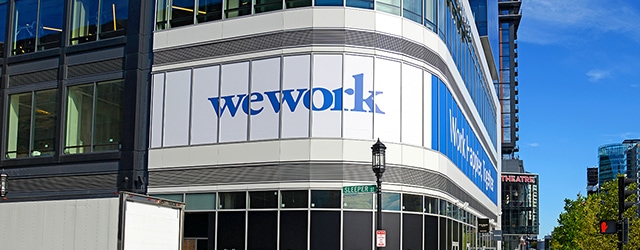WeWork becomes The We Company and still has not made a profit in nine years of operation.

January was a cold month for WeWork Cos. First, a $2 billion equity infusion from Japan’s SoftBank Group, was disappointing—far less than the $16 billion the investment fund had pledged earlier, on top of the $8 billion it had already sunk in. It drove down the shared-space purveyor’s valuation and prompted it to rebrand as The We Company.
Some of the revaluation arose from changes in market sentiment, some because Softbank’s sovereign wealth fund co-investors from Saudi Arabia and the UAE rely on SoftBank to pick tech-sector unicorns, not real estate plays.
A week later, the company was embarassed by a Wall Street Journal exposé explaining that WeWork’s CEO—kibbutz-raised Adam Neumann, who holds a commanding 65% of voting shares—was earning millions from buying buildings and leasing them back to the company. The self-dealing sparked concern among investors and rebukes from good-governance experts.
Nine years old and still unprofitable, the rebranded co-working enterprise is increasingly being seen as a firm that—tear down all the “community” and “subculture” tinsel—merely sublets office space. And there’s plenty of competition. In addition to a slew of WeWork imitators, Anglo-European IWG, formerly Regus, has been providing similar services since 1989 and has 2,300 spaces worldwide. WeWork has a little more than 500.

WeWork CEO Adam Neumann |
WeWork became an international sensation by going after startups and fast-growing businesses rather than catering to the globetrotting executive who prefers to work in an office rather than a hotel room or a coffee shop. Almost one-third of its space, spread through 27 countries, is allocated to firms with more than 1,000 employees, which value being able to reserve space as needed in any of 100 cities worldwide.
Even with SoftBank’s backpedaling, the firm founded by kibbutz-raised Adam Neumann and commune-raised Miguel McKelvey is not exactly cash-starved, with an estimated $7 billion in the bank. “WeWork has billions in cash and deep-pocketed private equity backing,” wrote Edmond DeForest, a senior credit officer at Moody’s, “but spending on its ambitious global growth plans mean it will likely be years before there are consolidated profits or free cash flow.” Since publishing that note, the bond-rating agency has suspended WeWork coverage.



